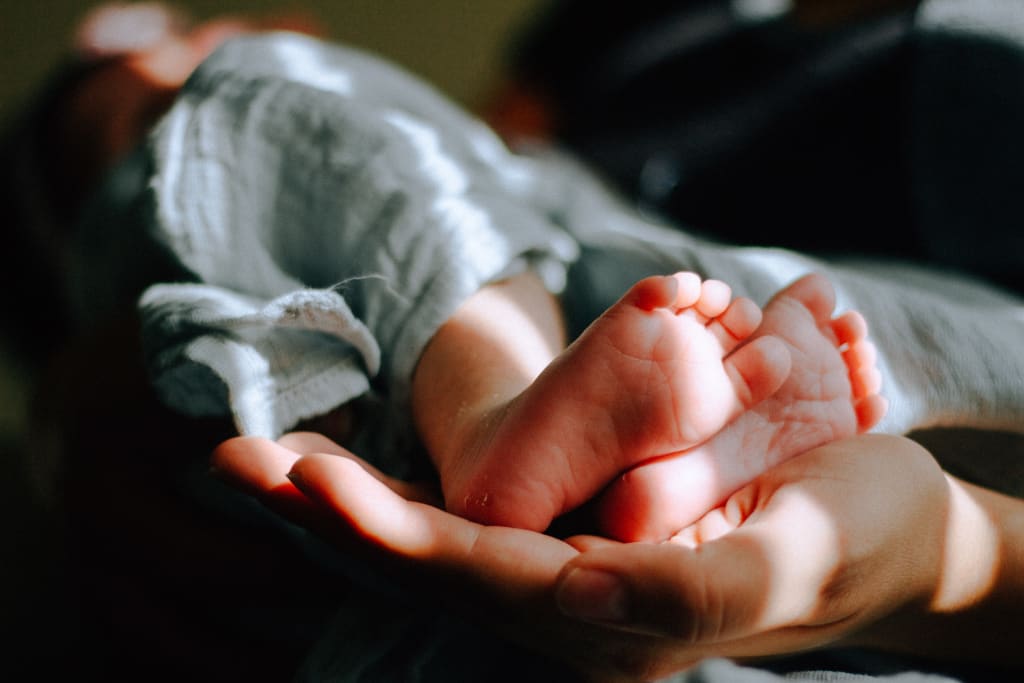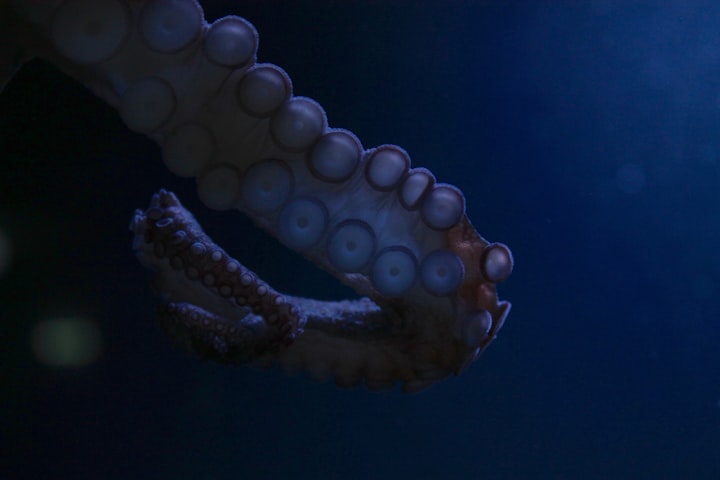
A shrill, piercing, echoing cry stops the mother short.
She knows it did not come from either of her eighteen-month-old twins, but she glances down at the cover of her sturdy jogger anyway, listening for sounds of their stirring. Their quietness has been a blessing since having to leave the truck behind days earlier. Its engine was too loud and rumbling and had left her feeling exposed, even with her dog Marble, an extremely well-trained, cookies-and-cream coloured pitbull, sitting vigilant in the passenger’s seat beside her as they drove.
Marble whines at the mother’s side, ears twitching toward the source of the cry, still far off, but very much human. The mother’s heart kicks against her ribs as she listens for even the slightest suggestion that the road ahead is unsafe. The dog has not given her any sign to imply there is someone or something close by, so the mother resumes her trek after a slow, deep breath.
Green paint has marked the way to her destination, and quickly became a reassurance to the mother since she began her journey on foot. Bold green arrows and symbols painted on the sides of buildings, on the roads at intersections, and on now-obsolete traffic signs, have all been directing her to Everett Farm.
That radio transmission had been the first voice she’d heard, other than her own or the babbles of her children, since burying her husband. She dug the grave herself on a bitter April night, in the backyard of the home they had wanted to grow old in. The transmission had offered hope and had brought the mother to tears that evening, leaving her sobbing and laughing as grief and loneliness and relief spilled out from where she had tried to bury them eleven weeks earlier.
Ensuring her children’s wellbeing and her own was how she could keep her husband alive, which is what has brought her to this small abandoned town, its emptiness making her feel an entirely different kind of exposed compared to the truck. Without Marble, she would surely have succumbed to the paradoxical fear of what or who could be lurking in any of these buildings or around any of these corners. Though very much like her drive out of the city, she has not encountered a trace of any other living being. Until now.
The mother clears another block before the crying starts up again, but she does not dare veer away from the markers guiding her course, too afraid that someone could be using those cries as bait. She has to remind herself to trust Marble’s training, to trust that she would alert her to any potential threats.
As the mother rounds a corner, the street opens up to a large park space, including an overgrown field with a border of trees at its furthest end, and a colourful jungle gym within sight. A small red brick building sits on a raised cement foundation in the middle of the lawn, which must once have served as a public restroom and drinking fountain station.
The next cry pierces through her, so much closer than she could have anticipated. Marble barks and rushes forward, defensive and uncertain, investigating something the mother cannot yet see. As she follows the dog she makes out a figure lying in a heap in the pale, dry dirt surrounding the small building just before the lush green grass begins. Marble stops, growls and barks a warning, and another scream makes them both startle.
From the very first cry, she knew the sound could not have come from an adult.
The mother’s heart kicks in her chest again, as she takes in the dark-haired man on the ground, with his face and chin bloodied, and a gash on his leg that hasn’t quite stopped bleeding. Marble wags her whole backside urgently, nudging and sniffing at the man and the bundle secured against his chest. It shifts as the mother steps closer and lets out another piercing cry.
“Marble, scout,” orders the mother, parking the jogger in the shade of the building. Marble gives a soft bark and begins trotting a partial perimeter around where they have stopped. The mother drops to her knees and undoes the fabric of the sling in which a tiny infant is cradled. Its head is sticky and crusted with blood, but the rest of it is untouched when the mother lifts it free from the sling.
“I’ve got you, baby, I’ve got you,” the mother coos, glancing back at the father on the ground before taking the infant, presumably a girl based on the floral onesie, over to the jogger. She lays the baby on her lap, grabbing some supplies and begins checking her over for injuries. After soaking a rag with water from her own bottle to wipe her clean, the mother concludes with a relieved sigh that the baby is uninjured.
Her little face gradually loses its strained flush from the force of her cries as the mother holds and soothes her. The grass and ground around the father are torn up and stained with smears of blood. There is no sign of a bag, and no way he could have travelled with such a small child, likely only a few months old, without supplies. He’s so dusty and bloodied she can only guess that he was robbed, and recently. Marble’s continued calm is her only comfort that the assailants did not stick around.
Gently setting the baby down on her sweater, she goes over to the man with her medkit and checks his pulse and breathing. He is unconscious. She assumes he was struck on the nose and cut with a knife— which luckily did not leave a deep wound. He does not wake while she patches him up, and wipes some of the blood and dirt from his face, revealing bronze and slightly sunburned skin.
She leaves her water bottle beside him and returns to the baby as she begins to cry again, familiar cries that she has heard for the last eighteen months of her own children’s lives. Pulling aside the strap of her shirt, the mother picks up and guides the baby to her breast.
“Come on, sweetheart,” the mother encourages, stroking her cheek and letting some of her milk touch the baby’s lips. With a little bit of coaxing, the baby finally latches and begins to nurse, her little hand reaching up to clutch at the mother’s shirt, contented little hums and whimpers leaving her throat.
Cloud cover temporarily dims the sunlight, removing the glare from the storefronts across the street that are still mostly intact. A sun-bleached billboard, spared in some places by the shade of large trees, advertises the jewelry store below it: an engagement ring, anniversary gift ideas… a customizable, heart-shaped locket that one could have engraved with an initial and adorned with a small stone. The example is a silver locket, engraved with the letter E, and adorned with an emerald stone.
The mother closes her eyes with a sigh, stroking the baby’s soft hair and pretending, just for a moment, that she is in her own backyard, nursing one of her own children as she had over a year earlier on that warm May evening when her husband blew out the candle on his birthday cupcake and kissed frosting onto her nose. Long before they grew worried, before Elliot got sick, before the twins lost their father.
When she opens her eyes, it isn’t soft blond hair she’s peering down at, but rather dark brown hair against light brown skin.
***
The first thing the father notices is the absence of his daughter’s weight on his chest. Her warmth has been the only thing to keep him going since having to leave their barricaded apartment weeks earlier.
The mother of his child had only been ten days postpartum when they first heard the Everett Farm broadcast. They’d fought bitterly over going, with her insisting that his ability to prepare and preserve food without traditional amenities would keep them fed and safe, that she was not strong enough to make such a journey so soon after giving birth.
But it was she who left abruptly in the middle of the night some two months later, forcing him to pack in haste and leave the safety of the apartment in search of clean water and formula to feed the baby she had abandoned so easily.
Which is exactly what he had been robbed of. Three against one, none moved by his pleas.
“I’ll give you my food, please— just let me keep one thing!”
One sucker-punched him, another knocked him to his knees, and when he’d brought his hands up to protect his daughter, yet another had slashed his leg with a knife. They took his bag and fled as quickly as they’d ambushed him. Until them, he had been very much alone since getting out of the city.
It was the sight of the blood and the ensuing panic attack that had done him in and blacked him out.
There is a throbbing mask around his nose and a slow, burning ache in his leg, but his face feels cold and damp. He opens his eyes, bringing his hand up to his chest where his daughter is not, and finds a wet rag there instead. And then he hears his little girl’s soft gurgle and turns his heavy head toward the sound.
A woman’s murky blonde hair is haloed by the late afternoon sun, his daughter cradled in her arms, her little fist clutching the woman’s shirt as she nurses.
The father starts to cry, a weak laugh leaving his lips, awash with relief knowing his baby would not starve. He screws his eyes shut, sobs shaking his chest.
“She’s alright,” the woman assures, and says nothing else, letting him work through the tears until he needs to sit up and blow his nose with the rag.
A medium-sized, sturdy-looking dog comes over and sits just in front and to the side of the woman, looking at him intently.
“That’s Marble,” the woman says, adjusting her top and switching the baby over to her other breast as if it were the most natural thing in the world. “What’s your baby’s name?”
The father exhales in disbelief, another tear slipping down his cheek.
“Renée,” he says, voice hoarse and full of love. “Her name is Renée.”
He glances at the jogger, two pairs of little feet visible through the partially opened front flap.
“What’s your name?” he asks.
The woman’s expression is soft and sad.
“Perion,” she replies, nodding at the jogger. “And those are Eloise and Peter.”
“Alec,” he croaks out. “I’m Alec.”
He drinks from the bottle of water beside him, looking over when Renée whimpers, and watching Perion rub her back.
“Thank you,” Alec says.
Perion laughs. “Thank her. I wouldn’t have found you without her powerful set of lungs.”
Alec finds himself laughing with her, the first real joyful laughter he’s experienced since Renée was born.
“She has a knack for saving my life,” he says.
“You wanna tell me about that?”
Alec nods, clearing his throat. “It’s a long story.” He meets her patient gaze and knows he’ll tell her every gritty detail.
“I’m going to Everett Farm,” she says.
“Everett Farm,” he repeats thickly, laughing again. “Me too.”
A slow smile plays at Perion’s lips.
“You can tell me the story along the way then,” she says thoughtfully.
Alec smiles back at her, ready to follow her anywhere.
“I will.”
-----------------
Thank you so much for reading! Your engagement helps me reach a wider audience! If you like my work and would like to support me, please click the heart and consider leaving a tip. No amount is insignificant. ♡
— Rooney
About the Creator
Rooney Morgan
'97, neuroqueer (she/they), genre-eclectic (screen) writer.
Thanks for visiting my profile, if you'd like to find me elsewhere click here.






Comments
There are no comments for this story
Be the first to respond and start the conversation.